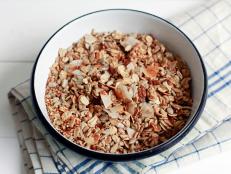One Small Change: How Often Should I Eat?

A common point of discussion on the this blog is what to eat, I wanted to take a moment to discuss another important topic: when should we eat, and how often? What follows is a combination of research findings and my own experiences working with clients as a registered dietitian.
Current research has shown that we should be eating somewhere between three to six times per day, though no one frequency has been proven to be better than others. If you find yourself consistently starving at a certain point in the day (and maybe making a less-than-ideal food choice), then consider adding in an additional healthy mini-meal or snack to your routine. Here are a couple great options to consider:
Eating less than three meals a day, however, has been associated with poor appetite control. Think about how you feel when it’s been a long time since you’ve eaten: you may be physically or mentally fatigued, irritable, more susceptible to cravings and even a little shaky. These are symptoms of low blood sugar. Planning and eating consistent meals can help maintain a steady blood sugar, which will in turn allow you to make better choices, avoid temptations and feel more energetic. Just be sure the foods you eat don’t spike your blood sugar, so avoid candy, cookies or chips.
Finally, when should you stop eating? Rather than focusing on ending after a particular time, aim to eat your last meal about two hours before bedtime. So in summary, let’s consider a typical day. If you sleep seven hours per day, then you’re awake 17 hours. If you eat about every four hours, then that’s four meals per day.
How much should you eat at each meal? Start eating when you’re hungry, not starving. Then eat until you’re satisfied, not stuffed. If you measured your hunger level on a scale of 0 = starving to 10 = stuffed, then aim to eat your meals when you are around a 2 or 3 and finish each meal around a 7 or 8. In other words, don’t go to extremes. It takes your body at least 15 to 20 minutes to realize that it’s full, so take your time, enjoy your food and eat when you’re hungry.
Nutrition Journal: Impact of breakfast on daily energy intake – an analysis of absolute versus relative breakfast calories.
The Journal of Nutrition: Effects of eating frequency, snacking and breakfast skipping on energy regulation
Jason Machowsky, MS, RD, CSCS is a registered dietitian, certified personal trainer, author of Savor Fitness & Nutrition wellness blog and avid proponent of MyBodyTutor, a health coaching website dedicated to helping people stay consistent with their healthy eating and exercise goals.
































